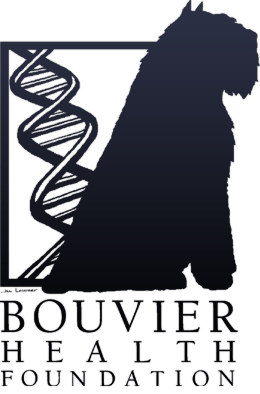The blueprint for life is a chain of nucleic acids formed into DNA molecules. DNA molecules are linked together into genes and the genes are then organized into twisted strands to form Chromosomes. The unique pattern of assembly of an animal’s genes within the chromosomes, its genetic material, form its inherent capacity for growth and health. An individual dog’s genetic material reflects the splitting and recombination of the chromosomes of its sire and dam. Thus, knowledge of the genetic make-up of our Bouviers will assist us, as breeders, in choosing the best possible combination of sire and dam to be the parents of a litter of puppies.
There are two pathways toward gaining the ability for predicting what health concerns (or benefits) a puppy is most likely to inherit from prospective parents. The first, and more exact, way is to support research to develop tools for searching the chromosomes of a dog to determine the presence of a genetic pattern that indicates a particular disease. This “pattern search” often is referred to as “looking for a DNA Marker” (link to SNP chip article). The Bouvier Health Foundation has joined with several other breed foundations through the AKC-CHF (American Kennel Club Canine Health Foundation) in supporting research to identify a DNA marker associated with a predisposition for developing glaucoma (make a link to the correct page). The AKC-CHF provides matching funds and administrative support for alliances of breed organizations for research on the myriad of genetic issues affecting dogs.
The second, and less precise way, to estimate the potential of an individual dog to contribute to genetically transmitted diseases in progeny is to test the dog itself, and as many of its relatives as possible, for the presence of specific health conditions. As an example, one of the most commonly administered health tests for canines is x-rays of the hips and elbows to show symptoms of a potentially painful, quality-of-life disease called dysplasia of the joint. (The x-rays are evaluated and registered with the Orthopedic Foundation for Animals or PennHip.) The presence of hip or elbow dysplasia is a clear indication that an animal is genetically predisposed for the disease; thus, there is a possibility that the dog will contribute some genes that predispose its offspring for developing the disease.
An absence of expressed symptoms of dysplasia and many other health conditions, however, is not assurance that harmful genes are not present. Modes of inheritance can be complex. For instance, genetic diseases may be recessive, which means that both parents must contribute a gene for the disease to be expressed, or regulated by multiple genes that may even be located on different chromosomes, or even triggered by environmental factors. For such complex hereditary diseases, and dysplasia appears to be one, understanding the pattern of inheritance and making an educated prediction of the likelihood that a puppy will inherit the disease depends on testing multiple relatives of the sire and dam for symptoms.
Obviously, until genetic markers for inherited diseases become available, we need access to results of health tests from many individual Bouviers represented in the pedigree, including siblings of dogs in the direct lines of ancestry. The Bouvier Health Foundation, with approval of the American Bouvier des Flandres Club, has enrolled Bouviers in the Canine Health Information Center (CHIC) (link to CHIC article). Voluntary registration of individual Bouviers in CHIC currently requires certification of testing for hip and elbow dysplasia, cardiac exams, and eye exams through OFA, PennHip, and CERF. The eye exams should be updated periodically. Thus the Bouvier Health Foundation has a two-fold mission. One task is to educate Bouvier fanciers about concerns of genetic health. The second task is to support research that contributes to awareness about the genetic make-up of Bouviers
